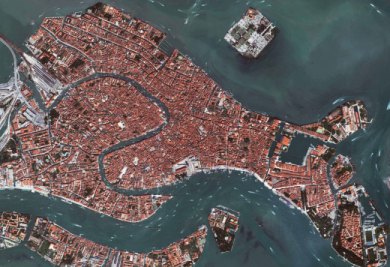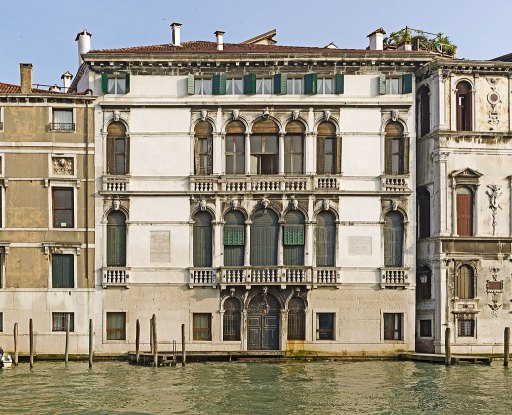2.
As the
Rialto
loomed ahead in the mild June afternoon, the gondolier spoke up again,
telling
Filippo all about the new bridge. The magus was only half-listening to
the
details about the contest for its design, thinking instead of how its
previous
incarnation's rotting wood and
faltering drawbridge had been
to him, fourteen years before, an emblem of his own precarious
position--and now it stood
transformed, a marketplace over
the Grand Canal, arched on solid stone like a temple, if only to
Mammon. Perhaps
some day, thought Filippo, I too will be transformed, my body a
temple
to the thrice-great one, a bridge to infinity.
"When I was here
last," said Filippo to the
gondolier, "I wouldn't walk on the bridge, for
fear it would
collapse."
"It
did collapse once, signor, long before we
were born, in 1440-something I think it was, with the weight of the
multitude. When
were you last here, signor?"
"The plague had
just ended.
I only spent about
six weeks here, lecturing at Domenico Venier's academy. It was the year
of Tycho's comet, '77 I believe."
"I never saw the
comet.
First it was cloudy, then
I was . . . convinced I shouldn't look at it. A thing of
evil, my father said."
"Che peccato,
signore," said
Filippo. “Such a beautiful sight you
missed. A terrifying
beauty, for I
too thought it a Sign of the Times. Now I know better." They
glided under the
bridge. Emerging from its
shadow, looking straight up at it, Filippo thought it seemed a bit
top-heavy. I hope it doesn't topple, he
said, and was grateful
that the gondolier
was now shouting and laughing to one of his cohorts who happened to be
rowing
by, after which he fell silent again, perhaps finally realizing that
his
passenger was not a small-talking tourist. He probably assumed this
skinny scholar was really in
Venice to give some boring lecture. Best to leave him alone; he needs
to think.
Truth to tell,
none of his other royal sojourns had ended quite right. Filippo had an
unfortunate knack for falling out of favor, but passing under this new
bridge--now wasn't this a good omen? The
top-heaviness was merely
an illusion, in this city of illusions born in the multi-colored
flicker of
light on dark water. But still he must be careful. So here he was
incognito,
using his baptismal name rather than his notorious nom de guerre,
seeking out counsel from the one person in Venice (other than the
bookseller
Ciotto), whom he trusted: Veronica
Franco. All of those superlatives he had
wasted on Queen Elizabeth should have been Veronica's. Not that he was in love
with her; a
successful magus must never kneel in the mud of devotion. Rather he
must
convert the amorous lust-bond to Eros, from matter to spirit. To spirit
through matter as Veronica herself had done, but never by bonding
herself
inextricably to a man. He knew that she could advise him well about the
nobleman’s invitation, for she had done so fourteen years before, in
the year
of the great comet, when she had exhorted him to curry favor at Henri's court. Filippo
had first noticed her, conspicuous as
the only woman in the audience of one of his lectures at Venier's academy,
but he didn't actually
meet her until that day in Ciotto's
bookshop, where she had gone to see
how her
book of poems was selling.
|


